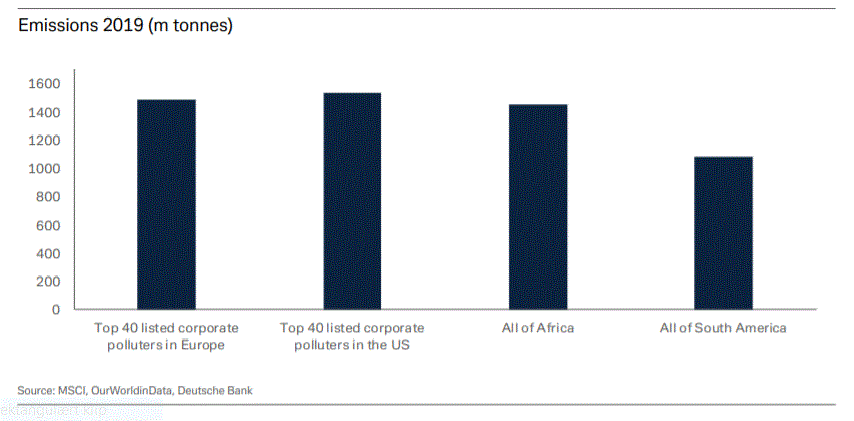Deutsche Bank skriver i en analyse af konsekvensen ved COP 26, at der bliver lagt en voksende byrde på virksomhederne, men at byrden rammer meget forskelligt. De mest forurenende virksomheder har den forholdsvis laveste indtjening, og de har dermed de dårligste muligheder for at skabe en grøn produktion. De kan blive straffet af investorer, regeringer og forbrugere. Men virksomheder, der evner transformation til grøn produktion, får gavn af forbrugeropbakning og af de stadigt bedre grønne finansieringsmuligheder. Sagt med andre ord: De kommer en stærkere opslitning mellem “dårlige og gode” selskaber. De 40 største forurenere blandt børsnoterede selskaber i Europa og USA udleder hver især lige så meget CO2 som hele Afrika.
After COP 26 – the burden shifting to corporates?
Governments from around the world will parade their climate credentials at the COP 26 summit … but when the dust has settled, much of the pressure to implement their plans will be delegated to corporates. PostCOP, firms will be pushed via policy or social pressure to spend more to mitigate climate change. The cost may be high but proactive firms are already being rewarded by customers and investors. Those that delay may face penalties.
Our analysis shows the cost of change is a key worry for managers. Mentions of this have jumped in corporate documents this year. That is particularly the case as corporates with the greatest carbon intensity (even within each sector) have lower cash reserves and lower profit margins. This makes it harder for them to bear the cost of reducing their carbon profile.
The good news is our surveys show that customers increasingly seek brands where they believe the company’s climate story. Investors are also snapping up climate-focussed corporate bonds. Still, this is a double-edged sword. Where a company is deemed to lag its peers, product boycotts are becoming more common.
Companies must be profitable to fund the change necessary to decouple their profits from emissions. This is possible as climate-related financial products have gone mainstream, particularly since covid. Sustainability-linked bonds and Assets-as-a-Service are two that are growing in popularity. As more ESG-based financial products emerge, the corporates that use them will receive a double benefit: greater profitability and better relations with governments, investors, and customers.
COP 26 has already witnessed new announcements from governments about reducing emissions. In reality, it will fall to corporates (either directly or indirectly) to fulfill these promises. Incentives and punishments will be part of the deal. Government initiatives will come on top of customer and investor pressure.
The responsibility will fall on corporates because they are massive polluters. The following chart shows that the top 40 listed polluters in the US and Europe emit roughly the same amount of carbon as all countries in Africa combined, and about a third more than all the countries in South America combined.












